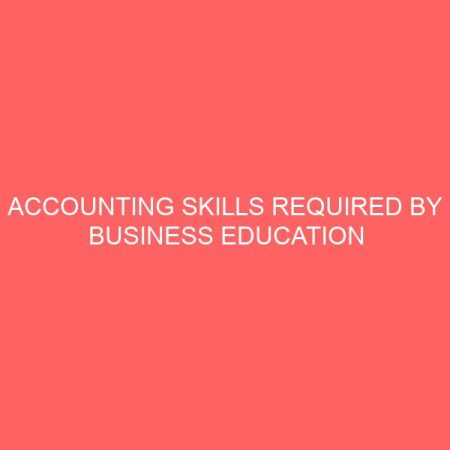Description
CHAPTER ONE INTRODUCTION Background of the Study Business education is a type of education that gives skills for business rated occupations. Business education trains learners or provides learners with information or competencies needed by all in the management of personal business affairs. However, Business Education according to the American Vocational Association in Osuala (2004) is a programme of instruction which consists of two parts: the first part is office education; a programme for office careers through initial refresher and upgrading education, leading to employment and advancement in office occupation. The second part is general business education; a programme to provides students with information and competencies which are needed by all in managing personal business affairs and in using the services of the business world. Business education is the sum total of human activities directed towards providing and acquiring specialist knowledge, skills and attitude that are required for successful promotion of business enterprise (Osuala, 2004). Anao (2006) defined business education as an educational process or content which has its primary aim as the preparation of people for roles in business enterprise. Two major specific objectives of business education are the preparation of learners 1 for vocational experience and development of skills, activities and personal habits which forms the basis for further development of employable skills (Nolan, Hayden and Masbary in MounyJoy, 2007). In essence business education apart from equipping one with such vocational skills as secretarial, marketing, administrative and management skills for business success, also equips its graduates with accounting skills, which enables the graduates succeed in entrepreneurship. Accounting is one of the major occupation areas of Business Teacher Education that prepares students for job or employment within a wide range of business careers. Accounting is generally viewed as information system about the financial affairs and the operation of a business. It is a statement of money held in trust, expressed in credit and debits. Accounting may also be defined as a statement proffering the use of assets and management of liabilities of a business venture, expresses in a book-keeping form (Clarke, 2002). Accounting is generally useful for effective management of business ventures through the accurate recording, analyses and interpretation of business transactions (Osuala, 2004). American Institute of Certified Public Accountants (AICPA) in Anao (2002) defines accounting as an art of reading, classifying and summarizing in a significant manner and in terms of money, transactions and events of a financial character and interpreting the result thereof. According to Anao (2002), this definition identifies the major activities found in accounting which include, recording and summarizing of data, usually expressed in monetary terms and the subsequent interpretation of the resultant accounting information. This definition also emphasizes that accounting has to do with only transactions and events which have financial implications. In the context of this study, accounting is one of the areas of business education that prepare graduates for a job or employment within a wide range of business careers due to the inherent skills the beneficiaries acquired.







